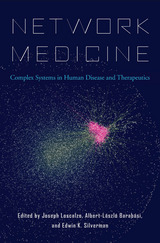

Along the way she makes these principal points: She criticizes as politically conservative the idea that diseases result from a multifactorial web of causes. Placing responsibility for disease prevention on "society" is ideological, she argues. In connection with the air traffic controllers she questions whether it is in a union's best interests to claim that workers' jobs are stressful. She shows why there are no entirely neutral answers to questions about the toxicity of environmental pollutants. In a final chapter, Tesh urges scientists to incorporate egalitarian values into their search for the truth, rather than pretending science can be divorced from that political ideology.

Big data, genomics, and quantitative approaches to network-based analysis are combining to advance the frontiers of medicine as never before. Network Medicine introduces this rapidly evolving field of medical research, which promises to revolutionize the diagnosis and treatment of human diseases. With contributions from leading experts that highlight the necessity of a team-based approach in network medicine, this definitive volume provides readers with a state-of-the-art synthesis of the progress being made and the challenges that remain.
Medical researchers have long sought to identify single molecular defects that cause diseases, with the goal of developing silver-bullet therapies to treat them. But this paradigm overlooks the inherent complexity of human diseases and has often led to treatments that are inadequate or fraught with adverse side effects. Rather than trying to force disease pathogenesis into a reductionist model, network medicine embraces the complexity of multiple influences on disease and relies on many different types of networks: from the cellular-molecular level of protein-protein interactions to correlational studies of gene expression in biological samples. The authors offer a systematic approach to understanding complex diseases while explaining network medicine’s unique features, including the application of modern genomics technologies, biostatistics and bioinformatics, and dynamic systems analysis of complex molecular networks in an integrative context.
By developing techniques and technologies that comprehensively assess genetic variation, cellular metabolism, and protein function, network medicine is opening up new vistas for uncovering causes and identifying cures of disease.

An important contribution to medical anthropology, this work defines the principal causes if illness that are reported throughout the world, distinguishing those involving natural causation from the more widely prevalent hypotheses advancing supernatural explanations.
READERS
Browse our collection.
PUBLISHERS
See BiblioVault's publisher services.
STUDENT SERVICES
Files for college accessibility offices.
UChicago Accessibility Resources
home | accessibility | search | about | contact us
BiblioVault ® 2001 - 2024
The University of Chicago Press









